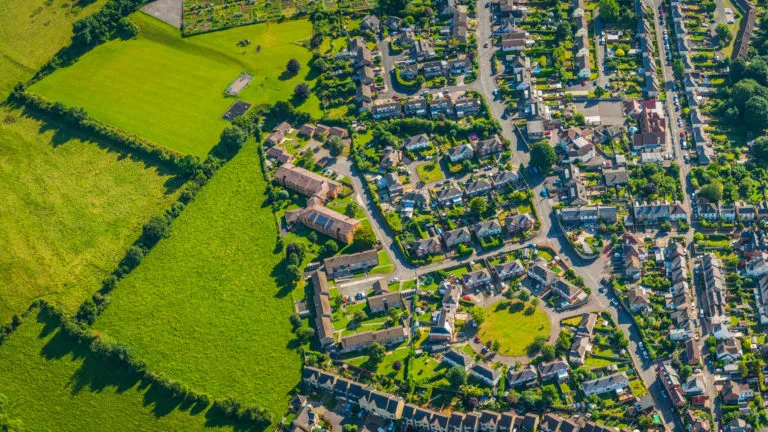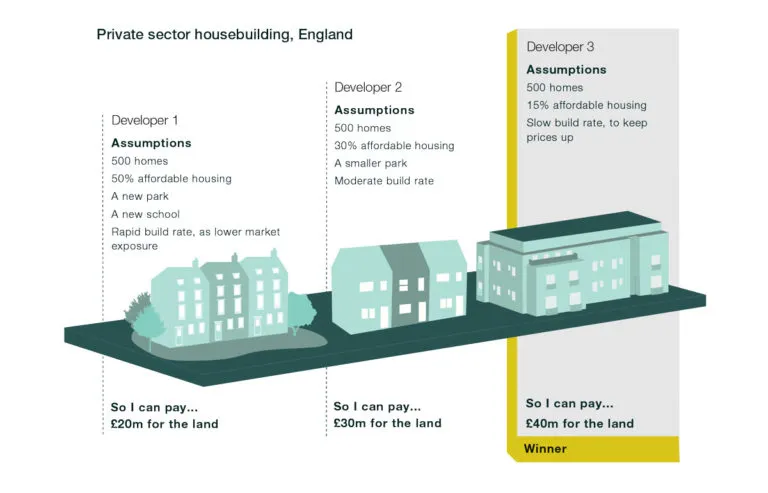No, lower land prices aren’t something to worry about
Published: by Robin White

Lowering the cost of land is a holy grail in trying to fix our housing crisis. Why? Because the high land prices that we see in our current speculative development system directly lead to less affordable housing, slow build-out and poor quality.
Recently, the Sunday Telegraph covered this issue with an article about a possible land price cap being introduced in the updated National Planning Policy Framework (NPPF). What the Sunday Telegraph talks about isn’t a land price cap as such, but proposals to use a form of Existing Use Value+ (EUV+) to calculate land value when establishing whether a developer should be allowed to reduce the level of affordable housing on a scheme .
The Home Builders Federation (HBF) claims that this valuation method will lead to a worsening of the housing crisis. Its logic is that if developers have to pay for land at a price that allows affordable homes to come forward, landowners might get less profit and will refuse to sell. That would mean less land in the market.
However, this ignores the mammoth returns seen in the land market in recent years. Land is routinely sold for hundreds (or even thousands) of times its existing use value, with most of the extra value created by planning permission flowing to the landowner. As a result, the value of land has risen by 544% since 1995. Such rapid price appreciation in the land market is impacting on the housebuilding industry’s ability to provide homes at prices people can afford, and rises of this size cannot reasonably be considered necessary to incentivise development. In fact, rapid land price inflation is likely to slow down housing development in areas of the country where more housing is most needed. Why should a landowner sell their land now when it is likely to keep appreciating more quickly than other investments? Those who do not need the money now are better off waiting.
Some of these recent gains could therefore be shared with communities in the form of affordable housing, without impacting landowners’ incentives to put land into development, provided policy change is implemented gradually and transparently.
That’s not the only reason we disagree on this one either.
Removing a loophole being exploited by some developers
As the Sunday Telegraph article explains, developers currently overpay for land and then don’t meet local policy requirements: ‘Developers are currently able to argue that they are unable to meet a council’s demands for specific levels of contributions for their site because of the high levels of payment required for land itself.’
This means communities often don’t get affordable housing because the developer ‘had’ to pay too much for land. But this system is circular – the only reason the developer can pay too much for the land is because they know that they can reduce the commitments. That is effectively a license to assume lower affordable housing levels when calculating the price paid.

The government has been clear that it intends to stop this – and to make sure that viability is used less. While we aren’t convinced that the current proposals will do this, the intentions are absolutely the right ones. Overpaying for land is a business choice, not a reason not to provide affordable homes.
Landowners won’t withhold sites if there is clarity in the long term
In the past, landowners have refused to sell land when they disagree with new government measures that might lower prices. Some suggest this would inevitably happen again to scare governments into not acting on out of control land prices.
The logic doesn’t hold though, and it is perfectly possible to bring down land prices and avoid this happening. The key to doing this: long-term clarity.
If land prices were to come down dramatically (which wouldn’t happen under the proposals on the table), then landowners will only hold out if they think this policy might change. But if a Conservative government passed new rules, and it was clear that there would be no repeal if the Labour party took office, then there would be no reason for landowners to try this.
In the past, Labour has passed measures which the Conservatives have promised to repeal. That is what causes the withholding of land and it is that which must be avoided. This gives landowners long-term clarity over what the rules will be and ensures that they adjust their expectations of what land is worth accordingly.
So what we believe we need is for a Conservative government to make changes to lower land prices, and Labour to be clear that it won’t change those rules if it comes to office. Based on current Labour policy proposals, this seems highly unlikely. We would also recommend implementing change gradually and transparently to give land traders and developers time to adjust.
The government proposals on land valuation would only matter in certain circumstances
If the system worked, then EUV+ would only be used to value land when a developer tries to argue that a scheme cannot provide affordable homes. On schemes which will deliver the required levels of affordable homes, landowners and developers would be free to maximise their profits. In lots of cases developers could put in land bids above EUV+ and still easily deliver on local policy requirements. So the chances of land being withheld on a massive scale because EUV+ is the only price you can pay is fundamentally flawed.
So the housing crisis won’t get worse?
Lowering land prices to levels that reflect local policy wouldn’t make the housing crisis worse – in fact it would go a long way towards solving it.
The NPPF as it stands isn’t perfect, and probably wouldn’t lower land prices. However, these problems lie in the detail not the intent – if the government really does want lower land prices to ensure affordable homes get built, then we stand right alongside it in trying to do that.
For more information on our campaigning around the NPPF, see our recent blog or briefing.